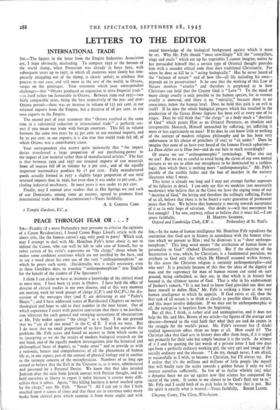PEACE THROUGH FEAR OR . . . ?
Sin,—Frankly (if a mere Prebendary may presume to criticise the opinions of a Canon Residentiary), I found Canon Roger Lloyd's article with the above title, like the famous curate's egg, only good in parts! Which said, may I attempt to deal with Mr. Hamilton Fyfe's letter about it, not to defend the Canon, who can well be left to take care of himself, but to rebut certain of his critic's aspersions on "the clergy," about whom he makes some confident assertions which are not justified by the facts, and to say a word about his own use of the very " anthropomorphism " on which he pours such scorn. (Incidentally, was it really necessary, even in these Greekkss days, to translate " anthropomorphism " into English for the benefit of the readers of The Spectator?) I think I can claim to have as intimate a knowledge of the clerical mind as most men. I have been 53 years in Orders. I have held the office of director of clerical studies in my own diocese, and at this very moment am meeting week by week groups of clergy (C.F.'s and 0.C.F's.) for dis- cussion of the messages they (and I) are delivering at our " Padre's Hours " ; and I have addressed scores of Ruridecanal Chapters on matters theological and hope to add to their number in the near future. Out of which experience I assert with positive conviction that there is no justifica- tion whatever for such general and sweeping accusations of obscurantism as Mr. Fyfe makes against " the clergy " as a body. I do not pretend that we " are all of one mind " in the C. of E. I wish we were. But I do insist that no small proportion of us have faced for ourselves the problems Mr. Fyfe raises and found an answer to them which seems to us (accepting as we do the results of modern biological research on the one hand, and of the equally modern investigations into the historical and philosophical bases of dogma), to " make sense " and to provide us with a rationale, honest and comprehensive, of all the phenomena of human life as, in one aspect, part of the content of physical biology and in another as the intimate concern of the metaphysician. Numbers of us long ago ceased to believe that the Evil in the Universe is, as it were, administered and governed by a Personal Desire. We know that that idea invaded Judaism after the exile from Jewish contact with Persian thought, and we hold ourselves at liberty to regret it today because it creates more diffi- culties than it solves. Again, " this killing business is never touched upon by the clergy," says Mr. Fyfe. " Never "1 All I can say is that I hate touched upon it scores of times and that there are in existence today many books from clerical pens which examine it from many angles and with
sound knowledge of the biological background against which it must be set. Why Mr. Fyfe should "most unwillingly " kill the " caterpillars,
slugs and snails " which eat up his vegetables I cannot imagine, unless he has persuaded himself that a certain type of Oriental thought provides him with a sounder ethical code than does traditional Christianity. For
when he does so kill he is " acting biologically." Has he never heard of the " balance of nature " and of how life—all life including his own—
depends on its preservation? Is he sure that the working of this Law of Nature involves " cruelty " and therefore is perplexed as to how Christians can hold that the Creator God is "Love "? To the mind of many clergy cruelty is only possible to the human species, for in essence cruelty is immoral, and there is no " morality," because there is no conscience, below the human level. Does he hold that pain is an evil in itself? If he does the whole biological process which has resulted in the production of the Genus Homo Sapiens has been evil at every one of its stages. Does he still think that " the clergy " as a body teach a " doctrine of God " which paints Him as an Oriental Potentate, an absolute and irresponsible Monarch, Himself untouched by suffering, yet inflicting it more or less capriciously on man? If he does he can know little or nothing of the content of modern religious philosophy and he has been very unfortunate in his choice of preachers (if any) to " sit under." Does he imagine that none of us have ever heard of the famous French aphorism— Le Dieu difini est le Dieu fini—and do our best to teach accordingly?
Of course we use " anthropomorphic " terminology. What else can we use? But we are as careful to avoid being the slaves of our own mental pictures as we are to allow our metaphysic to be dominated by a ruthless logic, than which there is nothing more "anthropomorphic." Mr. Fyfe's parable of the earthly father and the box of matches in the nursery illustrates what I mean. • This letter is already too long and I may not attempt further exposure of his fallacies in detail. I can only say that we moderns (not necessarily modernist) who believe that in the Cross we have the coping stone of our " doctrine of God," the loving and therefore the willingly suffering, Father of us all, believe that there is to be found a surer guarantee of permanent peace than Fear. We believe that humanity is moving towards acceptance of it as its only hope of salvation. Our doubt is—will that movement be fast enough? I for one, anyway, refuse to believe that it must fail.—I am Oxford and Cambridge Club, S.W. r. Prebendary of St. Paul's.


























 Previous page
Previous page